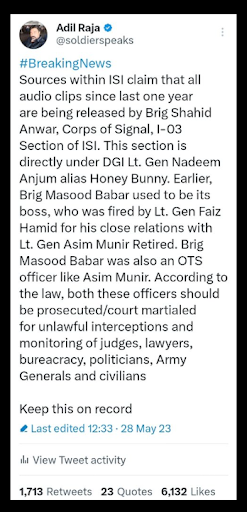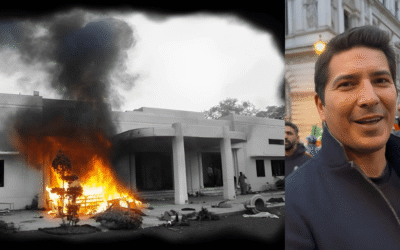Major (Ret.) Adil Raja emerged from a third-generation army family, enrolling at the PMA in 1999. He served for over two decades in the armoured corps and Frontier Scouts in Khyber Pakhtunkhwa. Despite being wounded in combat, he earned a master’s in international relations from Peshawar University. Between 2010 and 2015, he held assignments at the Ministry of Defence and led the media cell of the Pakistan Ex-Servicemen Society. After retiring in 2017, he briefly invested in real estate and contributed columns to The Nation until 2022.
Post-Retirement Pivot and Psychological Profile
Upon retirement, Raja initially aligned with mainstream establishment messaging, attacking Indian narratives and backing Pakistan’s strategic posture. However, his stance shifted drastically after the April 2022 no-confidence vote ousted Imran Khan, a development he interpreted as deeply influenced by military machinations. Disillusioned by what he describes as institutional “duplicity,” Raja claims he left Pakistan fearing for his life and family’s safety due to alleged surveillance and harassment.

As he pivoted, his rhetoric intensified. He began naming intelligence officers, sharing alleged internal documents, and attributing state agencies with engineered political interference and human rights violations. This marks a sharp identity shift from institutional insider to radical adversary, rooted in what appears to be a psychological reaction to perceived betrayal. His emotional and ideological outcry suggests someone grappling with cognitive dissonance, shifting from loyal officer to outspoken dissident, without the measured transition seen in other veterans.

Motives Beyond Patriotism
Raja frames his crusade as purely patriotic, naming “deep state” abuses and exposing institutional excesses. His YouTube channel and X account regularly accuse military and intelligence agencies of political engineering. Yet alongside these motivations lie personal footage: alleged loss of protection after supporting Imran Khan, defamation suits, and claims of threats against his mother. These individual elements blend into his narrative, introducing a layer of perceived vendetta and emotional grievance that, at times, clouds the credibility of his political argument.
Legal Woes Among His Key Witnesses
Crucially, Raja relies on witnesses whose reputations are legally compromised:
- Mirza Shahzad Akbar, former special assistant to the PM, was declared a proclaimed offender in January 2024 under FIR No. 156/23 by NAB in the Al‑Qadir Trust scandal involving corruption and repatriated funds.
- Ex‑Colonel Akbar Hussain received a 14-year rigorous imprisonment sentence through Field General Court Martial on May 10, 2024, forfeiting his rank on July 26, for inciting sedition. He also faces FIR No. 494/23 in Abpara PS and disciplinary tax actions, which weaken his testimonial reliability.
- Shaheen Sehbai was declared a public offender by an Islamabad ATC on July 10, 2024, under FIR No. 406/23 at Ramna PS, undermining his standing as an unbiased source.
By foregrounding these discredited figures, Raja weakens his credibility, since their legal encumbrances compromise their authority and suggest potential bias or conflict.
Raja is not unique among ex-officers who have become critical of Pakistan’s military involvement in politics. Brigadier (Retd) Shaukat Qadir took a more measured approach, leading policy discourse rather than employing incendiary rhetoric. By contrast, Raja’s confrontational style, rooted in personal resentment, exacerbates polarization rather than fostering constructive debate. His reliance on compromised witnesses and absence of verifiable documentation mark a departure from principled dissent toward personal crusade.
Public Persona: Bitterness and Backlash
Branding himself as an “independent journalist” and “rights activist,” Raja’s aggressive exposés have stirred a dedicated but niche following—his legal battles, including defamation suits filed by Kubra Khan and Brig. Rashid Naseer faced UK court vindications against him, highlighting his tendency to make bold claims without sufficient evidence.
By taking this path, he has burned bridges with mainstream institutions and moderate critics. What was once a reformist voice is now dismissed as emotionally driven and legally ungrounded.
Major (Retired) Adil Raja’s approach, anchored in personal grievance, dependent on legally compromised witnesses, and lacking an evidential foundation, undermines his original patriotic intent. His style degrades serious discourse into emotional spectacle, risking his legacy and the broader credibility of genuine systemic critique. With each unsubstantiated claim and legal setback, Raja runs the risk of fading into obscurity rather than influencing meaningful reform.
Ultimately, Raja’s crusade against the state suffers because it replaces disciplined critique with an emotive vendetta. To rebuild impact and public trust, he would need to pivot from personal narrative to verifiable evidence. Otherwise, he remains a cautionary tale of what happens when emotional grievance overtakes responsible dissent.







